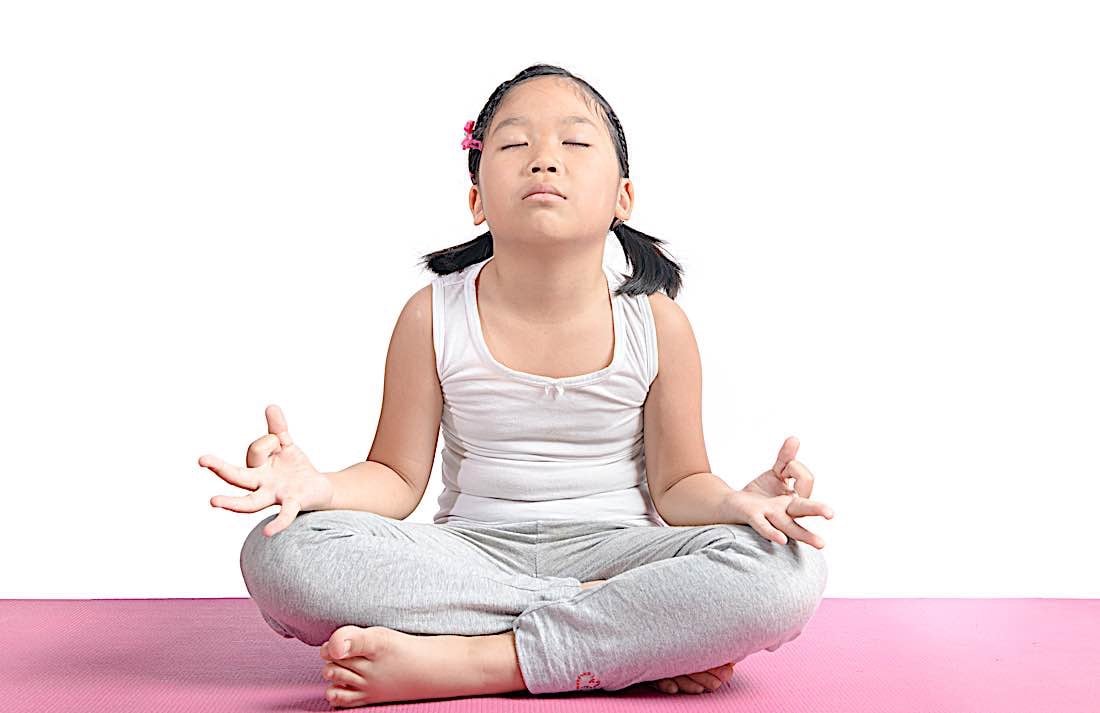How Children Benefit from Meditation? 5 Reasons to teach your kids meditation.
Parents are more open to different methods and techniques to educate and train their children — especially to balance the negative impact of technology and internet. To help kids reach their full potential, one of the best and proven methods that can help children is meditation.
By Mike Zhang
What is Meditation?
Meditation is the art of concentrating through mental and physical awareness. It is a technique of focusing one’s mind on a specific object. It takes a lot of concentration — a proven cognitive method — to keep a child focused on one particular subject.

Although meditation has had its roots in India, modern meditation does not involve religious practices and traditions. With technology becoming more and more a part of children’s lives, they become busier by the minute, suffering, like adults, from information overload. Meditation can offset the negative aspects of over-exposure to media.
What are the Benefits of Meditation for Children?
Parents should try to guide and teach meditation to their kids, at least once, to ensure children experience its benefits. Skillful training may be needed to engage and interest children in “stilling” their active minds. With so many things to teach our children, what are the benefits of taking the time to train and educate our kids in meditation? Here are five reasons:
1. Meditation helps control emotions
The regulation of emotions is a must for children to cope in life. Meditation helps by improving control over emotions. Understanding how the mind functions will greatly help in knowing how to react to situations. Since meditation focuses on the concentration in the mind, this technique will also be able to touch the inner emotions that one has in different conditions.

The emotions that can be regulated through meditation are of two kinds: the inner emotions and the outward emotions. The inward emotions refer to what is actually felt at a specific moment. Inner emotions do not necessarily translate to physical manifestations and actions, but it still affects the body and the health of the child. If your children can control their inner emotions, they will be able to keep mind rational and calm even in stressful situations — at least within reason.
The second kind of emotion is outward emotion. This is the kind of emotion that is exhibited to other people. This may generally not be as devastating to oneself, but it can definitely have adverse effects on other people. Since meditation can help keep the child calm and collected, his anger, his voice, and his other actions may also be somewhat moderated.
2. Meditation reduces anxiety
Children can be the most insecure people in the world. Depending on how they are raised, kids may see themselves as incapable and in need of attention. Being stressed about the outside world can cause anxiety to kids. Meditation can be one remedy to counter such anxieties in life. Our children may not attain Nirvana, but they should be able to better control worldly passions and ease. Through meditation, children can be who they are and what they want to be without the worry or stress of being judged or humiliated by other people. Meditation gives children a sense of composure to deal with problems and other obstacles that they may face in their current age and the future.

3. Meditation helps steer children away from electronics
The practice of meditation requires the children focus inward, have a keen sense of concentration and mental awareness without any distraction from the world. This means the kids set aside minutes or even hours in a day for meditation. This saved time is a period in their lives every single day without using smartphones, tablets, computers, desktops, laptops, and other mobile devices. Meditation keeps them unplugged for a couple of minutes to reflect, concentrate, focus and imagine.
4. Meditation trains proper breathing
Meditation is not just freeing the mind, but it also involves proper breathing. The breathing involves the right kind of interval between the inhale and exhale. The right way of breathing will help the overall health of any individual because it allows the right amount of air to come in and out of the body for effective bodily functions. As young as the kids are, they should know the correct way of breathing so that they can bring the technique even when they become adults.

5. Meditation increases focus
Since mediation teaches children about mindfulness, the focus and attention span of the children also increases. A minute of being focused may not seem as much for adults, but for children, a minute can translate to an enormous amount of learning and absorption of information. Children who are focused can accomplish a lot more tasks and store more facts in their minds.
Conclusion
Meditation is a great technique to teach kids to train their minds and thoughts. It is a unique discipline method benefiting the mind and the body of the children. Parents should be open to such skill development practices — to fully educate the kids of the rewards of having a sound body and mind. Meditation will not only train their thoughts, but it will also keep them healthy. Through meditation, children can grow up to have fully developed abilities and have enough self-control to perform at their best in every aspect of their lives.
More articles by this author

Chintachakra White Wish-Granting Wheel Tara: The All-in-One Mother of Buddhas in Vajrayana Buddhism – Her Significance, Mantra and Why Her Practice is Essential

The First Doctor: Medicine Buddha Bhaisajyaguru Lapis Lazuli Light — Empowering You to Heal; the Buddha of Healing and Medicine and Doctors

Upaya: Is Skillful Means, Imagination and Creativity the Path to Realizations? Experiential Buddhist Practice or Yogas Enhance Intellectual Study.
Search
Latest Features
Please support the "Spread the Dharma" mission as one of our heroic Dharma Supporting Members, or with a one-time donation.
Please Help Support the “Spread the Dharma” Mission!

Be a part of the noble mission as a supporting member or a patron, or a volunteer contributor of content.
The power of Dharma to help sentient beings, in part, lies in ensuring access to Buddha’s precious Dharma — the mission of Buddha Weekly. We can’t do it without you!
A non-profit association since 2007, Buddha Weekly published many feature articles, videos, and, podcasts. Please consider supporting the mission to preserve and “Spread the Dharma." Your support as either a patron or a supporting member helps defray the high costs of producing quality Dharma content. Thank you! Learn more here, or become one of our super karma heroes on Patreon.
Lee Kane
Author | Buddha Weekly
Lee Kane is the editor of Buddha Weekly, since 2007. His main focuses as a writer are mindfulness techniques, meditation, Dharma and Sutra commentaries, Buddhist practices, international perspectives and traditions, Vajrayana, Mahayana, Zen. He also covers various events.
Lee also contributes as a writer to various other online magazines and blogs.















